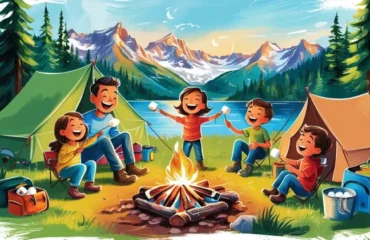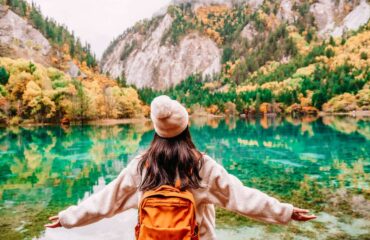From Gear to Trails: Essential Tips for Planning Your First Camping Trip

Planning your first camping trip can be both exciting and overwhelming. From choosing the right gear to finding the perfect trail, there are many factors to consider when embarking on this outdoor adventure. But fear not, as we have compiled a list of essential tips to help you plan a successful and enjoyable camping trip. Whether you are a beginner or an experienced camper, these tips will ensure that you are well-prepared for your time in the great outdoors.
The first step in planning your camping trip is to determine what gear you will need. This includes essentials such as a tent, sleeping bag, cooking supplies, and clothing suitable for the weather conditions. It is important to invest in high-quality gear that will keep you comfortable and safe during your trip. Do some research on different brands and products to find the best options for your needs. Additionally, consider renting gear if you are unsure about making a large investment upfront.
Next, choose a suitable camping location that matches your skill level and preferences. If you are new to camping, opt for established campgrounds with amenities such as bathrooms and water sources. Research different campsites online or ask friends and family for recommendations. Consider factors such as proximity to hiking trails, scenic views, and availability of facilities when selecting a campground. Make sure to reserve your campsite ahead of time to secure your spot.
When packing for your camping trip, remember to bring all the essentials while keeping your load light. Create a checklist of items such as food, water, first aid kit, flashlight, map or GPS device, and personal items like toiletries and sunscreen. Pack clothing layers that can be easily added or removed depending on the temperature changes throughout the day. Don’t forget to pack entertainment such as books or games if you anticipate downtime at the campsite.
During your camping trip, practice Leave No Trace principles by minimizing impact on the environment. Dispose of waste properly by packing out trash and following designated trails while hiking. Respect wildlife by observing from a distance and avoiding feeding animals. Be mindful of noise levels at the campground and follow any rules set by park rangers or staff members. Leave the campsite better than you found it by cleaning up after yourself before departing.
Lastly, reflect on your camping experience after returning home by documenting memories through photos or journal entries. Take note of what went well during the trip and areas where improvements could be made for future outings. Share stories with friends or family members who may be interested in joining you on future adventures. Use this feedback to refine your skills as a camper and continue exploring new trails and campsites in different locations.
From Gear to Trails: Essential Tips for Planning Your First Camping Trip
Embarking on your first camping trip is an exciting adventure, but it can also be a bit overwhelming if you’re not sure where to start. From selecting the right gear to choosing the perfect trail, careful planning is key to ensuring a safe, enjoyable, and memorable experience. Here’s a comprehensive guide to help you plan your first camping trip with confidence.
1. Choosing the Right Campsite
Why It Matters: The location you choose for your first camping trip sets the tone for the entire experience. Picking a campsite that matches your skill level and interests is crucial.
Tips:
- Start Close to Home: For your first trip, consider a campsite that’s not too far from home. This way, if anything goes wrong, you’re not too far from help.
- Campgrounds vs. Backcountry: Decide whether you want to camp in a developed campground with amenities like restrooms and water, or if you’re ready for backcountry camping, which requires more self-sufficiency.
- Research Campground Amenities: Look for campsites with amenities that suit your needs, such as picnic tables, fire pits, and nearby hiking trails.
- Consider the Environment: Think about the type of environment you’d enjoy—forest, desert, mountain, or beach. Each offers a different experience and challenges.
2. Essential Gear for First-Time Campers
Why It Matters: Having the right gear can make or break your camping trip. It ensures you’re prepared for the elements and can enjoy your time outdoors comfortably.
Must-Have Gear:
- Tent: Choose a tent that’s easy to set up, weather-resistant, and appropriately sized for your group. Practice setting it up at home before your trip.
- Sleeping Bag and Sleeping Pad: A quality sleeping bag rated for the temperatures you’ll encounter is essential. A sleeping pad adds insulation and comfort.
- Cooking Gear: A portable stove, fuel, lightweight cookware, and utensils are necessary for meal preparation. Don’t forget matches or a lighter.
- Light Source: Bring a reliable flashlight or headlamp with extra batteries. A lantern can also be handy for lighting up your campsite.
- First Aid Kit: A basic first aid kit should include bandages, antiseptic wipes, pain relievers, tweezers, and any personal medications.
- Appropriate Clothing: Layering is key for camping. Bring moisture-wicking base layers, insulating mid-layers, and a waterproof outer layer. Don’t forget a hat, gloves, and sturdy hiking boots.
3. Planning Your Meals: Easy and Nutritious Camp Cooking
Why It Matters: Good food can enhance your camping experience, while poor meal planning can lead to hunger and discomfort.
Tips:
- Simple Menus: Plan simple meals that are easy to cook over a campfire or portable stove. Think one-pot meals, foil packet dinners, or pre-prepared food.
- Non-Perishable Foods: Pack foods that don’t require refrigeration, such as pasta, rice, canned beans, nuts, and dried fruit.
- Snacks: Bring plenty of snacks for energy while hiking, like granola bars, trail mix, and jerky.
- Water: Make sure you have enough water for drinking, cooking, and cleaning. If you’re camping in an area without a potable water source, bring a water filter or purification tablets.
4. Preparing for the Weather
Why It Matters: Weather can be unpredictable, especially in the great outdoors. Being prepared for different weather conditions ensures you stay comfortable and safe.
Tips:
- Check the Forecast: Before your trip, check the weather forecast for your camping location. Be prepared for sudden changes in weather.
- Pack for All Conditions: Even if the forecast is clear, it’s wise to pack a rain jacket and warm layers. Temperatures can drop significantly at night, especially in higher elevations.
- Sun Protection: Bring sunscreen, sunglasses, and a wide-brimmed hat to protect yourself from the sun.
5. Navigating the Trails: Hiking Basics
Why It Matters: Hiking is a key part of the camping experience, allowing you to explore the natural surroundings. Understanding trail basics ensures you have a safe and enjoyable hike.
Tips:
- Choose the Right Trail: For your first hike, select a trail that matches your fitness level and experience. Research the trail’s length, elevation gain, and difficulty.
- Bring a Map: Even on well-marked trails, it’s important to carry a map and know how to read it. GPS devices are helpful but shouldn’t replace basic navigation skills.
- Start Early: Begin your hike early in the day to avoid the heat and to ensure you have plenty of daylight to complete your hike.
- Stay on Marked Trails: Stick to designated paths to protect the environment and avoid getting lost.
- Leave No Trace: Follow Leave No Trace principles by packing out all trash, respecting wildlife, and minimizing your impact on the environment.
6. Safety and First Aid: Being Prepared for Emergencies
Why It Matters: Accidents can happen in the wilderness, so it’s important to be prepared to handle them.
Tips:
- Know Basic First Aid: Familiarize yourself with basic first aid skills, such as treating cuts, blisters, and sprains.
- Emergency Contact: Let someone know your camping location and expected return time. This way, help can be sent if you don’t return as planned.
- Wildlife Safety: Learn about the wildlife in the area and how to avoid dangerous encounters. Store food securely to prevent attracting animals.
- Fire Safety: Practice safe fire-building techniques and never leave a fire unattended. Always extinguish your fire completely before going to sleep or leaving the campsite.
7. Relax and Enjoy: Making the Most of Your Camping Experience
Why It Matters: Camping is about enjoying the great outdoors and finding peace away from the hustle and bustle of daily life.
Tips:
- Unplug: Use this time to disconnect from technology and reconnect with nature. Bring a book, journal, or just enjoy the sounds of the wilderness.
- Capture the Moment: Bring a camera or sketchpad to document your experience. Nature can be incredibly inspiring.
- Try New Activities: Whether it’s fishing, birdwatching, or star gazing, camping is the perfect time to try new outdoor activities.
- Take It Slow: Don’t rush your camping experience. Take time to relax, breathe deeply, and soak in the beauty of your surroundings.
Conclusion: Start Your Camping Adventure with Confidence
Planning your first camping trip doesn’t have to be daunting. With the right preparation, gear, and mindset, you’ll be ready to enjoy the adventure and serenity that camping offers. Whether it’s your first time pitching a tent or navigating a trail, remember that the goal is to connect with nature, unwind, and create lasting memories.
Planning your first camping trip can be an enriching experience that allows you to connect with nature while building valuable outdoor skills. By following these essential tips for choosing gear, selecting a campground, packing efficiently, practicing Leave No Trace ethics, and reflecting on your experience afterward, you can ensure that your camping trip is safe and enjoyable from start to finish. Remember that each camping trip is an opportunity for growth and learning – embrace the challenges along the way while savoring moments of peace and beauty in nature’s embrace.




